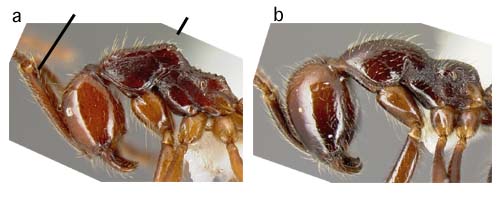
| Genus List | Genus Overview | Species List |
10a. Mesonotum distinctly humped; antennal scape surpasses posterior margin of head: gibbatus
10b. Mesonotum gradually arched or flattened; antennal scape does not distinctly exceed posterior margin of head: 20

20a. Transverse carina present near junction of dorsal and posterior faces of propodeum: postcarinatus
20b. Transverse carina absent at juncture of dorsal and posterior faces of propodeum: 30
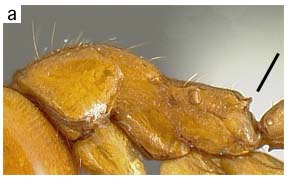
30a. Face strongly sculptured, foveate-granular, not shiny: 40
30b. Face smooth and shiny; density and size of piligerous puncta variable but interspaces are extensive, smooth, and shiny: 50
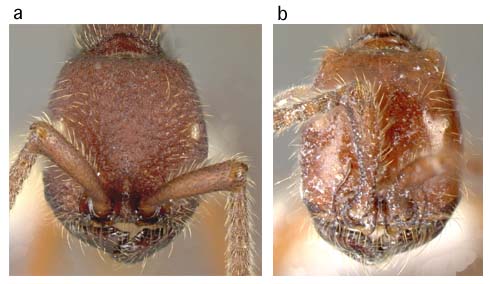
40a. Dorsum of postpetiole and first gastral tergite smooth and shining, contrasting with foveate-granular sculpture of petiole; in face view posterolateral margins of head without strongly produced triangular projections: asper
40b. Dorsum of postpetiole foveate-granular like petiolar dorsum; first gastral tergite shagreened with microreticulum, not smooth and shining; in face view posterolateral margins of head with strong triangular projections: sumichrasti
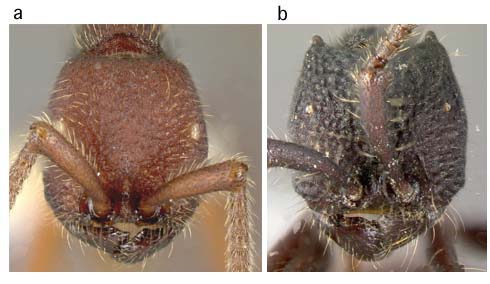
50a. Posterior face of propodeum strongly concave, distinctly indented below a rounded juncture of dorsal and posterior faces: 60
50b. Posterior face of propodeum rounded or straight, if somewhat concave medially (adnepos), concavity obscured in lateral view by lateral carinae: 70
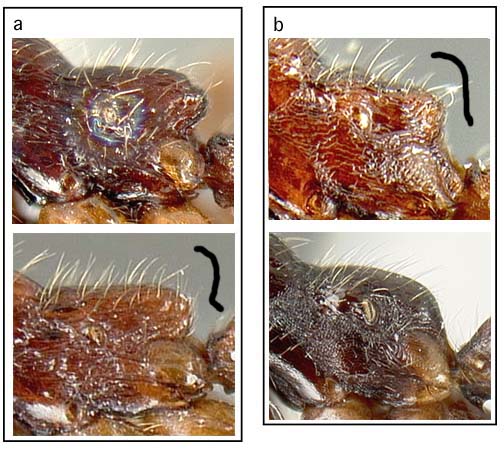
60a. Lacking violaceous reflections: alfaroi
60b. With violaceous reflections: iridescens

70a. Posterior face of propodeum as long or longer than dorsal face; eye without distinct convex cornea; apex of scape does not exceed eye level or middle of head if eye is absent: 80
70b. Differing in one or more of the above characteristics: 110
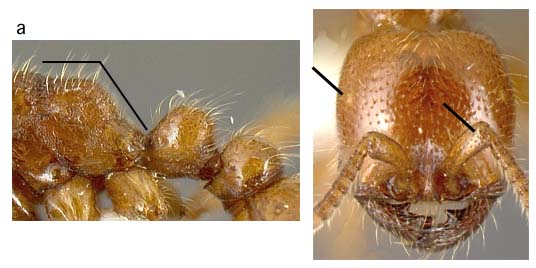
80a. Posterior face of propodeum concave medially, flanked by distinct lateral flanges: adnepos
80b. Posterior face of propodeum straight or slightly convex, lacking lateral flanges: 85
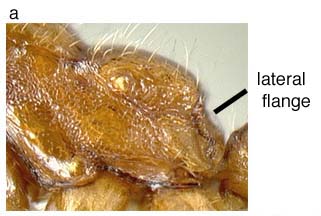
85a. Juncture of dorsal and posterior faces of propodeum forming sharp right angle; postpetiole in dorsal view relatively thin: compressinodis
85b. Dorsal face of propodeum rounding into posterior face; postpetiole in dorsal view relatively shorter and broader: 90
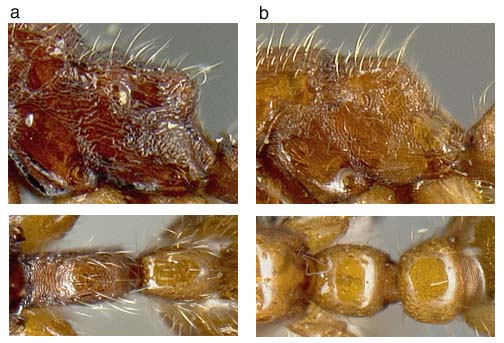
90a. Anteroventral tooth of petiole indistinct or absent; face with abundant strong puncta: punctaticeps
90b. Anteroventral tooth of petiole large and triangular; face with sparse smaller puncta: 95
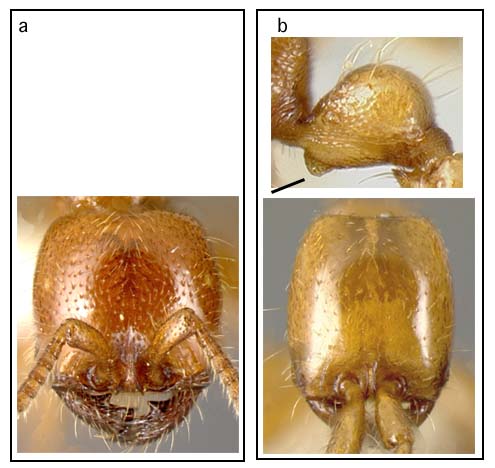
95a. Basal tooth of mandible of major enormous; eye completely absent; mesosoma of largest worker less than 1.2 mm long: macrodentatus
95b. Basal tooth of mandible moderate to small; eye absent or reduced to yellow speck below cuticle; size variable: 100
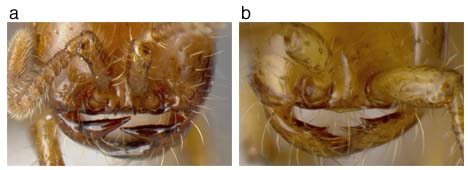
100a. Propodeal suture weakly impressed; dorsa of promesonotum and propodeum forming single flat surface; petiole in lateral view relatively less pedunculate: 105
100b. Propodeal suture impressed; dorsa of promesonotum and propodeum forming two separate convexities; petiole in lateral view somewhat pedunculate: JTL-002

105a. Head relatively broader; anteroventral postpetiolar tooth relatively smaller; dorsal setae relatively longer: swainsonii (=fallax)
105b. Head relatively narrower; anteroventral postpetiolar tooth relatively larger; dorsal setae relatively shorter: JTL-005
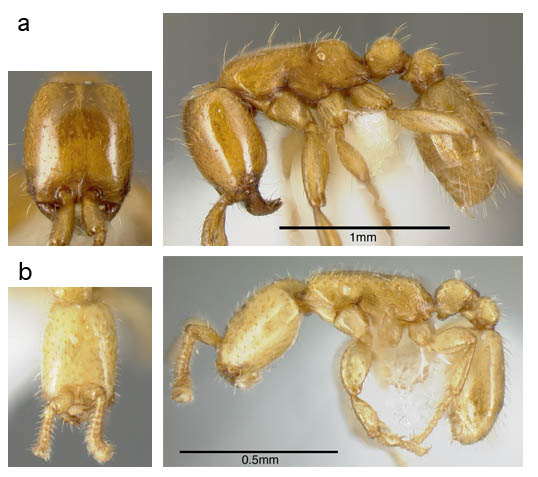
110a. Eye with distinct convex cornea: 120
110b. Eye without distinct convex cornea, reduced to yellow spot below cuticle or absent: 130

120a. Color dark red brown to black: pilosus mexicanus
120b. Color light red brown: 125
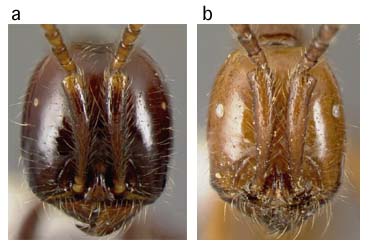
125a. Promesosomal dorsum relatively more arched, not in same plane as dorsal face of propodeum; anteroventral petiolar margin with sharp recurved tooth: impudens
125b. Promesosomal dorsum relatively flat, in same plane as dorsal face of propodeum; anteroventral petiolar margin with an anteriorly directed angular tooth: opacithorax
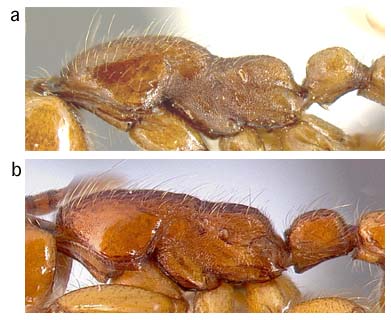
130a. Katepisternum and side of propodeum largely smooth and shining; anteroventral margin of petiole lacking tooth: humilis
130b. Katepisternum and side of propodeum more heavily sculptured; anteroventral margin of petiole with small tooth: JTL-001

Page author:
John T. Longino, The Evergreen State College, Olympia WA 98505 USA.longinoj@evergreen.edu